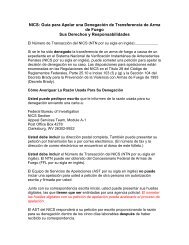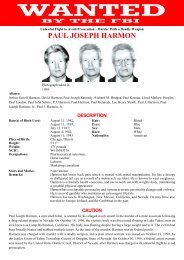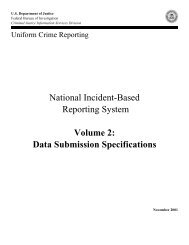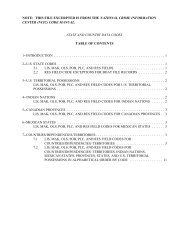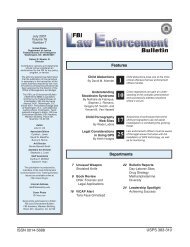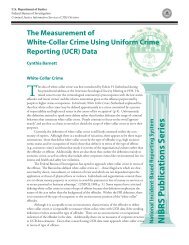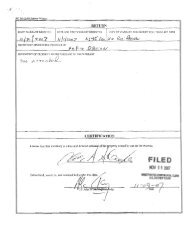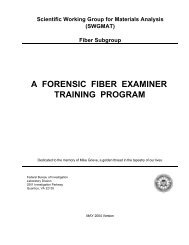F B I Law Enforcement Bulletin - June 2003 Issue
F B I Law Enforcement Bulletin - June 2003 Issue
F B I Law Enforcement Bulletin - June 2003 Issue
You also want an ePaper? Increase the reach of your titles
YUMPU automatically turns print PDFs into web optimized ePapers that Google loves.
are excellent, and sometimes essential,<br />
sources of information for both<br />
foreign intelligence and criminal<br />
activities. In 1968, Congress passed<br />
the Omnibus Crime Control and<br />
Safe Streets Act. Title III of that act 4<br />
contains provisions concerning the<br />
authorization and use of electronic<br />
monitoring by the government to<br />
gather information regarding criminal<br />
activities. Under Title III, the<br />
government has specific authorization<br />
procedures and rules to follow<br />
when it monitors people and places<br />
to collect evidence of violations of<br />
criminal laws. But, Title III did not<br />
answer the question of whether or<br />
not the government is required to<br />
obtain court authorization for electronic<br />
monitoring conducted, not<br />
for criminal investigations but for<br />
the collection of information regarding<br />
threats to national security.<br />
The U.S. Supreme Court faced<br />
this issue in the case of United<br />
States v. United States District<br />
Court. 5 In this case, a group of<br />
Vietnam War protesters tried to<br />
Special Agent Bulzomi is a legal<br />
instructor at the FBI Academy.<br />
26 / FBI <strong>Law</strong> <strong>Enforcement</strong> <strong>Bulletin</strong><br />
“<br />
blow up the local CIA recruiting<br />
office in Ann Arbor, Michigan, and<br />
a number of other government<br />
buildings. Evidence obtained during<br />
a domestic national security<br />
wire interception, undertaken without<br />
a formal court order, was used<br />
in the subsequent criminal trial. The<br />
use of this evidence was contested.<br />
The issue was whether or not the<br />
president had the authority, through<br />
the attorney general, to authorize<br />
electronic surveillance for national<br />
security matters without prior judicial<br />
review. The Court held that<br />
the government does not have unlimited<br />
power to conduct national<br />
security wiretaps for domestic security<br />
matters, and that prior judicial<br />
authorization is needed before using<br />
wiretaps for national security<br />
purposes. However, the Court recognized<br />
that such wiretaps involve<br />
different policy and practical considerations<br />
from ordinary criminal<br />
wiretaps. It suggested that Congress<br />
consider exploring the issue and decide<br />
if the authorization for and<br />
The government must<br />
use its new tools in a way<br />
that preserves the rights<br />
and freedoms guaranteed<br />
by America’s democracy,<br />
but, at the same time,<br />
ensure that the fight<br />
against terrorism is<br />
vigorous and effective.<br />
”<br />
rules governing the use of national<br />
security wiretaps should be the<br />
same as those governing criminal<br />
wiretaps. The Court made it clear<br />
that it was not deciding the issue of<br />
the government’s authority to conduct<br />
wiretaps in cases of foreign<br />
threats to the national security.<br />
To establish the necessary authority<br />
and procedures for the government<br />
to conduct wiretaps in response<br />
to foreign threats, Congress<br />
passed FISA. FISA established a requirement<br />
of judicial approval before<br />
the government engages in an<br />
electronic surveillance (as well as<br />
physical searches) for foreign intelligence<br />
purposes. The act established<br />
the FISA Court, consisting of<br />
U.S. District Court judges designated<br />
by the chief justice of the<br />
U.S. Supreme Court. The court’s<br />
purpose is to review government<br />
applications for national security<br />
electronic monitoring and searches<br />
and authorize their use with appropriate<br />
limitations. If the FISA<br />
Court denies an application for an<br />
order authorizing a national security<br />
wiretap or search, the matter is<br />
referred under seal to the FISA<br />
Court of Review, comprised of<br />
three federal judges selected by the<br />
chief justice of the U.S. Supreme<br />
Court. The court of review determines<br />
whether the application was<br />
properly denied. 6 Its decision can be<br />
appealed directly to the U.S. Supreme<br />
Court.<br />
FISA Contrasted with Title III<br />
In essence, the purpose of a<br />
FISA order is to gather foreign intelligence<br />
information, 7 while the<br />
purpose of a Title III wiretap order<br />
is to gather evidence for criminal<br />
prosecution. The FISA application




